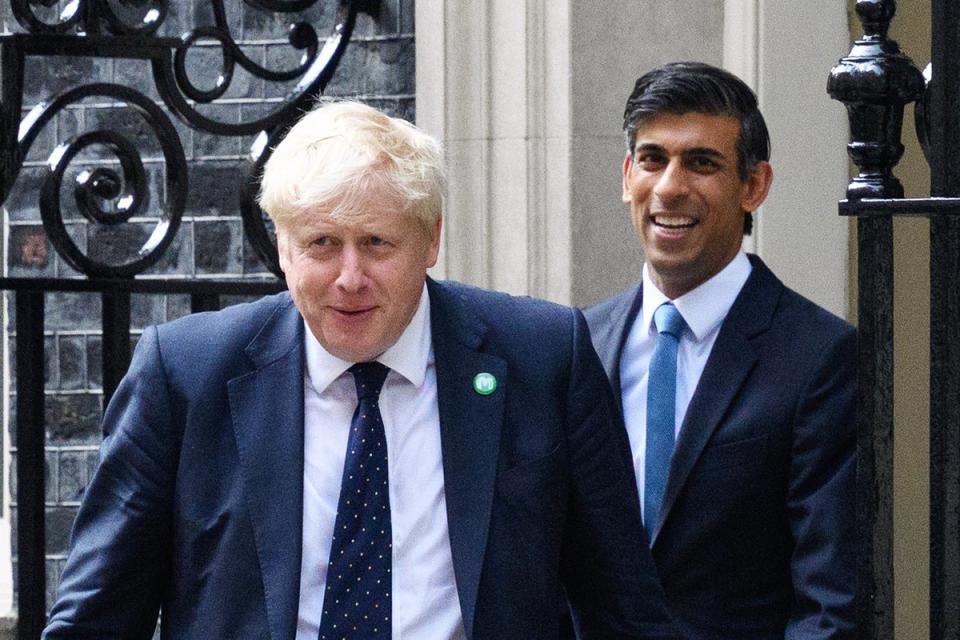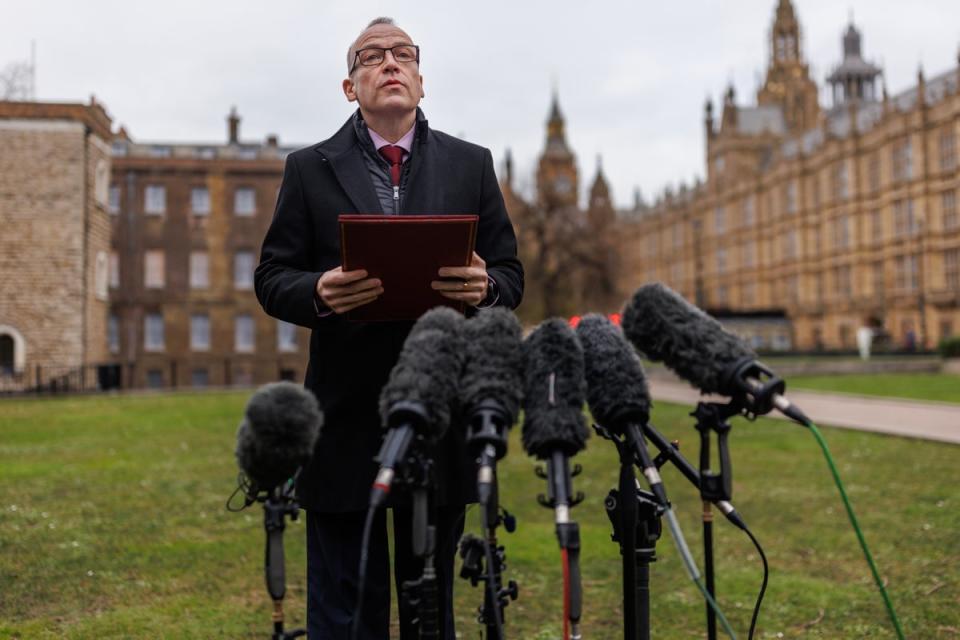Boris Johnson has attacked Rishi Sunak’s new Brexit deal with the DUP, warning it could bind the UK to EU trade rules in the future.
Sunak’s government has unveiled new schemes to scrap routine checks on goods moving from Britain to Northern Ireland in a bid to restore power-sharing at Stormont.
The checks required under the previous so-called “green job” will be further reduced – a tweak aimed at solving some of the unresolved mess left by Mr Johnson’s Brexit deal .
Despite being effectively an extension of his own deal, Johnson joined the Tory rebels in claiming the new arrangements could thwart Britain’s “freedom” to diverge from EU rules after Brexit.
The former prime minister – who has repeatedly criticized Mr Sunak since being ousted from Number 10 – called on his successor to have the “courage” to drop more Brussels regulations.
“We must maintain the appetite and courage to move away from the low-growth, high-regulation European model,” Johnson said on X, formerly Twitter.
“We must avoid at all costs a return to anything remotely resembling the disastrous ‘Chequers’ formula, where artificial concerns about the border between Northern Ireland and Ireland are used to draw the whole of Britain into to comply with EU rules.”

Johnson’s former Brexit negotiator Lord David Frost – believed to be part of a small cabal of right-wing MPs and ex-advisers plotting to topple Mr Sunak – said he agreed with the former prime minister.
The troubled Tory peer warned that the new deal with the DUP should not ‘delay’ the drive to move away from the EU.
Under the new deal set out in Mr Sunak’s ‘Safeguarding the Union’ document, the ‘red route’ for the movement of goods from GB to NI, and then on to the EU single market in the Republic of Ireland, will remain to exist.
But routine checks will be removed from the “green lane” on goods from Britain destined to remain in NI, replaced by only occasional checks where “smuggling and disease risks” are suspected.
The old “green lane” will be renamed the “British Single Market System”. And the government estimates that 80 percent of goods will now move without routine checks.
The government has pledged to amend domestic legislation – in particular part of the European Union (Withdrawal) Act – to confirm the fact that new EU laws will not automatically apply in Northern Ireland, and must first be subject to supervised by Stormont.
In an effort to appease both the DUP and Brexiteers by allowing UK deviations from EU standards, there is also a legal requirement that new legislation be assessed on whether it “affects trade between North -Ireland and Great Britain”.


But some Brexiteer Tory MPs remain sceptical. Former Home Secretary Priti Patel and former Business Secretary Sir Jacob Rees-Mogg challenged Northern Ireland Secretary Chris Heaton-Harris to explain how Britain could diverge from EU rules without arrangements for Northern Ireland to endanger.
Responding to their questions in the House of Commons, Mr Heaton-Harris insisted the deal did not change “the freedoms and powers we secured through Brexit”. The minister added: “It will not reduce our ability to disagree.”
But fellow right-winger Theresa Villiers – a former Northern Ireland secretary – said she was “troubled” by the deal and the prospect of it being pushed through parliament. “It is crucial that nothing in the agreement prevents Britain from diverging from EU rules,” she said The Telegraph.
However, DUP leader Jeffrey Donaldson has welcomed the plan, claiming it would effectively remove the disputed Irish Sea border for goods. “There should be no border within the UK single market,” he said. “These proposals remove that limit.”
Sir Jeffrey praised Mr Sunak for going further than Mr Johnson. “Although Boris Johnson promised us many things, he has not delivered on them. Rishi Sunak has worked with us, [Mr Heaton-Harris] has worked with us to implement these changes,” the DUP leader told the BBC.
The DUP has agreed to lift the two-year blockade of Stormont, but there are those within the unionist party who remain deeply skeptical of the proposed deal.
Sammy Wilson, the most outspoken, said Britain must still follow EU rules. “This is the result of this spineless, weak, Brexit-betraying government – which refuses to tackle the EU and its interference in Northern Ireland.”


Legislation promised in the deal will be fast-tracked through Parliament on Thursday to allow the restoration of Stormont institutions – possibly as early as Saturday.
Number 10 has insisted that the DUP deal would not mean the Windsor Framework Agreement Mr Sunak struck with European Commission President Ursula von der Leyen would not have to be reopened.
Downing Street said on Wednesday the deal includes “significant” changes to the “workings” of the Windsor deal, but is not about changing the “foundations” of the framework.
The European Commission effectively approved the new arrangement, saying it was arrived at “following in-depth technical discussions with the United Kingdom”. Vice-president Maros Sefcovic said on Wednesday it “responds to the needs of Northern Ireland businesses while protecting our internal market”.
And Michael Martin, the Deputy Prime Minister of the Republic of Ireland, does not expect the European Commission to object to the new Sunak plan, saying: “I don’t expect any particular problems on the EU side.”
It came as Tory minister Andrea Leadsom dismissed concerns from business leaders about expensive new checks on EU imports, calling them the “price you pay” for Brexit.
The Brexiteer said on Times Radio that British businesses must simply “adapt” to the new rules that came into effect on Wednesday, and suggested they should even consider “changing their trade deals with the EU” if they were struggling.
Nigel Jenny of the Fresh Produce Consortium (FPC) warned that the checks on food and plant importers are essentially a £200 million tax on the sector and would drive up prices for consumers.
And Paolo Arrigo, director of London-based importer Seeds of Italy, told us The independent that the new checks were “anti-small business” and that it was now easier to import from China than from France.